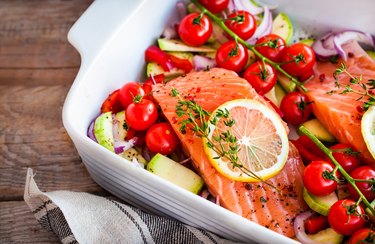
Inflammation isn't something that starts in mid- to later life, but it does tend to increase as we get older. And with it comes a higher risk for serious health conditions.
The problem of age-related inflammation — sometimes called "inflammaging — can't be completely avoided. But with a little bit of work in the healthy lifestyle department, it can be managed.
Video of the Day
Video of the Day
What Is Inflammation, Exactly?
We hear a lot about the harmful effects of inflammation. But at its core, inflammation is actually how the body protects itself, according to the Mayo Clinic. When you get an injury or infection, the affected tissues send out inflammatory cells to jumpstart the healing process. In the case of an injury, this can cause the damaged area to become red or swollen.
When all goes right, inflammation eases up once the damage to the body is repaired. But certain factors can create a state of chronic, long-term inflammation.
"It occurs when the body's immune response against infections, injuries and toxins lingers, leaving your body in a persistent state of alertness. It may adversely impact functions of body tissues and organs, too," says Kishor Gangani, MD, MPH, an internist at Texas Heath Arlington Memorial Hospital.
Over time, this state of constant inflammation can start to wreak havoc on the body and raise the risk for serious, long-term health problems, including heart disease, stroke, cancer, type 2 diabetes, arthritis and bowel diseases like Crohn's disease and ulcerative colitis, per Harvard Health Publishing.
Why Inflammation Worsens With Age
As we age, our bodies are more prone to experiencing chronic, low-grade inflammation, even without getting injured or sick, according to the National Center for Biotechnology (NCBI). Some of that has to do with cellular changes that naturally happen to older bodies, Dr. Gangani notes.
The problem gets worse for those carrying extra body fat, especially visceral or abdominal fat — which becomes more common with age.
"Fat cells are inflammatory-compound-generating machines. And more production of inflammatory chemicals and compounds in the body leads to more inflammation in the body," explains dietitian and doctor of public health Wendy Bazilian, DrPH, RD, author of The Superfoods Rx Diet.
5 Ways to Fight Inflammation as You Get Older

Experts agree that some amount of age-related inflammation may be inevitable. But modifying the factors we can control can go a long way toward keeping chronic inflammation in check as much as possible, Dr. Gangani notes.
And that, in turn, could help you lower the risk for chronic diseases as you age and improve your quality of life overall.
Here are the healthy habits that experts agree will give you the most bang for your inflammation-fighting buck.
1. Work Toward a Healthy Weight
Getting to and maintaining a healthy weight is one of the most important things you can do to reduce levels of chronic inflammation and protect your health overall.
Body fat seems to secrete inflammatory hormones, according to the NCBI. And these hormones have been shown to exist at higher levels in bodies with obesity, according to the Oregon State University Linus Pauling Institute.
On the other hand, simply losing weight can cause levels of inflammation-promoting hormones to drop, concluded a review of 76 studies in the December 2018 issue of Clinical Nutrition ESPEN.
And you may not have to lose much: "Modest weight loss of 5 to 10 percent of a person's body weight may offer significant benefits against chronic inflammatory states," Dr. Gangani says.
2. Look to Your Diet
Food can be a powerful ally — or a formidable foe — in the fight against inflammation. To keep meals and snacks on your side, stick with these proven menu strategies:
- Eat more colorful plant foods. Fruits and vegetables, whole grains, beans, nuts and seeds serve up phytonutrients, powerful plant compounds that can help keep inflammation at bay. "One of the functions of phytonutrients is to create anti-inflammatory response in the blood vessels, cells, tissues, organs and more," Bazilian says. Aim to get a variety of hues on your plate each day, because different colored foods boast different phytonutrients. "Simply ask yourself, 'where are the fruit and/or vegetables in this meal or snack?'" Bazilian suggests. "And then aim to get one or more in there."
- Steer clear of trans fats. These harmful fats directly raise levels of inflammation and are best avoided completely, per Harvard Health Publishing. Though trans fats are banned in the U.S., they may still appear in some fried foods, baked goods or buttery spreads in small quantities if a food contains less than 0.5 g trans fat per serving, according to the American Heart Association (AHA). So even if the nutrition label says a food contains 0 g trans fats, check the ingredient list. Trans fats are often listed as partially hydrogenated oils, the AHA says.
- Have more seafood and less red meat. The saturated fat in red meat may have a pro-inflammatory effect, while the omega-3s in fatty fish like salmon, tuna and mackerel can help lower inflammation, according to the Mayo Clinic. You can also find omega-3s in plant foods like walnuts, flaxseeds, pecans and soy.
- Save sugar and processed food for once in a while. Processed foods high in refined carbohydrates or sugar — think: cookies, sugary cereal, soda, pastries — trigger the release of inflammatory chemicals into the bloodstream, according to the Mayo Clinic. Make minimally processed foods like whole grains, lean proteins and fruits and vegetables the mainstays of your diet instead, Bazilian recommends.
Looking to follow an anti-inflammatory diet? Research has shown the Mediterranean diet can help tamp down inflammation. Get started with this four-week Med diet meal plan, curated by a dietitian-chef.
3. Manage Stress
There is evidence to suggest that stress may induce inflammatory changes in the brain and peripheral immune system, according to a August 2022 study in Biomedicines.
So find what gives you relief and try to incorporate it into your daily routine. Dr. Gangani is a fan of regular yoga or meditation, but other activities can have a similar stress-sapping effect, according to the Mayo Clinic:
- Make time to connect with family or friends
- Get enough sleep
- Do some journaling
- Listen to music
4. Be Active
Research consistently shows a link between regular exercise and lower inflammation levels, Dr. Gangani notes. In fact, just 20 minutes of fast walking can be enough to lower levels of inflammatory markers in the body, found a March 2017 study in the journal Brain, Behavior, and Immunity.
Whether it's biking, hiking, swimming, dancing, HIIT, tennis, tai chi or some other form of movement, the key is finding something you enjoy so you'll do it consistently.
You'll reap the biggest health benefits from exercise by being active for at least 30 minutes a day most days of the week, according to the Centers for Disease Control and Prevention (CDC). If you can do more, even better.
5. Make Sleep a Priority
If you're not getting the recommended seven to nine hours of sleep per night, it's time to start.
"Adequate sleep is vital to controlling chronic inflammation," Dr. Gangani says.
Impaired sleep quality was found to be independently associated with higher inflammation in healthy adult men and women, per a July 2019 study in Biology of Sex Differences.
If tackling these steps feels challenging or overwhelming, focus on making one change at a time. You might find that taking a single step toward less inflammation and better health motivates you to do more.
"Often, small benefits beget bigger benefits," Bazilian says. "When you start to feel more well or are able to do things that you couldn't do before, additional behaviors are there for the taking."
- American Heart Association: "Trans fats"
- TK: "Weight loss is a critical factor to reduce inflammation"
- Centers for Disease Control and Prevention: "How much physical activity do adults need?"
- Dimitrov S et al. (2017.) Inflammation and exercise: Inhibition of monocytic intracellular TNF production by acute exercise via β2-adrenergic activation.
- Dzierzewski J et al. (2020.) Sleep inconsistency and markers of inflammation.
- Harvard Health Publishing: "The truth about fats: The good, the bad, and the in-between"
- Liu Y et al. (2017.) Inflammation: The common pathway of stress-related diseases.
- Mayo Clinic: "Stress relievers: Tips to tame the stress"
- Mayo Clinic: "Want to Ease Chronic Inflammation? Start with Your Grocery List"
- National Center for Biotechnology Information: "Chronic inflammation"
- Oregon State University, Linus Pauling Institute: "Inflammation"
- Harvard Health Publishing: "Understanding acute and chronic inflammation"
- Biomedicines: " The Relationship between Stress, Inflammation, and Depression"
- Biology of Sex Differences: "Impaired sleep quality is associated with concurrent elevations in inflammatory markers: are post-menopausal women at greater risk?"
Is this an emergency? If you are experiencing serious medical symptoms, please see the National Library of Medicine’s list of signs you need emergency medical attention or call 911.


